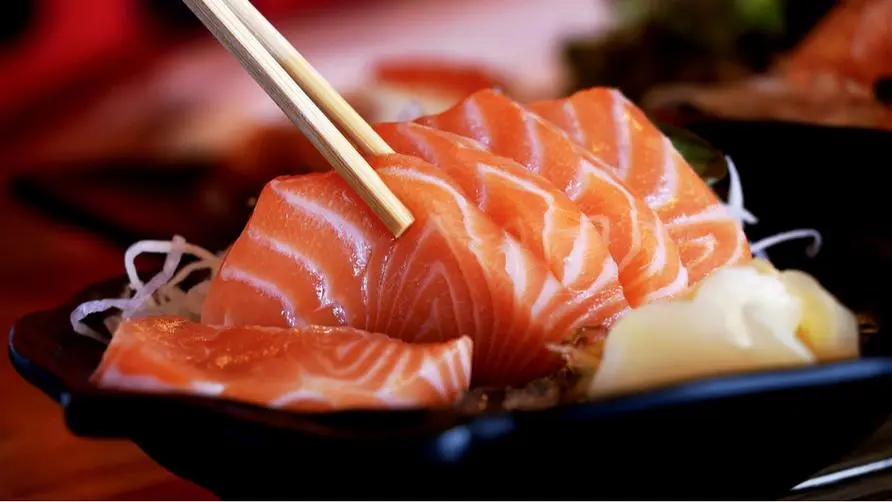Enjoy eating sashimi that comes with parasites! A gastroenterologist is shocked: Even stomach acid can't kill it

He was so happy to eat Japanese food that he even swallowed “parasites” together! The gastroenterologist was horrified: Even stomach acid can’t kill him
After eating delicious “sashimi”, I suddenly felt abdominal pain and nausea. Could it be caused by “parasites” in the food? Dr. Wu Wenjie, director of the Gastroesophageal Reflux Center of Yuanrong Hospital, shared on the social media that a patient suffered from severe gastroesophageal reflux in the clinic a few days ago. He immediately went to the doctor and had a gastroscopy and found that the patient had a live and jumping “parasite” in his stomach. insect".
Dr. Wu Wenjie said that the patient usually likes to eat sashimi, and he just visited a Japanese restaurant last week. Unexpectedly, while enjoying sashimi, I also ate parasites. The parasites had survived in the stomach for nearly a week, and even gastric acid could not kill them.
If you like sushi, aquatic products, and sashimi, beware of “marine gastric nematode disease”: 10 symptoms will come to your doorstep
In fact, if you eat seafood or seafood-related dishes such as sushi, you do have a certain chance of being infected by parasites. According to information published by the Taiwan Ministry of Health and Welfare, Food and Drug Administration, aquatic fish may be contaminated by “Anisakias” during the breeding process. Northern Europe, Japan, Latin America and other regions that like to eat raw aquatic products often Some people suffered from “Anisakiasis” as a result.
The Taiwan Food and Drug Administration pointed out that the poisoning symptoms of marine animal stomach nematodes usually appear 48 hours after consumption, usually last for 2-3 weeks and then disappear on their own, and a small number of cases may last for months or even years. Common symptoms include abdominal pain, nausea, vomiting, bloating, diarrhea, blood or mucus in the stool, mild fever, etc. Allergic reactions are often accompanied by skin rash and itching symptoms, and systemic allergic reactions are less common.
Will the number of parasites caused by accidental ingestion only increase? Research reveals: Nematodes have “increased 283-fold” in the past 40 years
Ingesting parasites such as marine gastric nematodes may sound horrifying; however, the even more disturbing news is that the probability of accidentally ingesting marine gastric nematodes may become higher and higher in the future. A 2020 study by the University of Washington in the United States pointed out that marine mammal gastric nematodes have “expanded approximately 283 times” in the past 40 years, and the possible underlying reason is the increase in the number of “marine mammals.”
Chelsea Wood, author of the study and assistant professor at the University of Wisconsin School of Fisheries and Fisheries Sciences, said that in recent years, due to climate change and Arctic ice melt, a large amount of nutrients have been released into the ocean currents, allowing marine mammals such as sea lions, walruses, whales, and dolphins to obtain Sufficient nutrition. Although this indicates that the marine ecology is recovering, excessive numbers of sea monster stomach nematodes may also infect more endangered marine life.
Wood said that after nematodes hatch in the ocean, they first infect small crustaceans, such as benthic fish and shrimp or small zooplankton such as copepods. When a small fish eats an infected crustacean, the nematodes will be transferred into its body; when a large fish eats the infected small fish, the nematodes will continue to change hosts until they are eaten by humans, because the nematodes cannot Mature in the intestines and stomach, lay eggs, and die as a result. In other words, humans are the “final host” of marine gastric nematodes.
Why are there so few cases of nematode infection in Taiwan? Experts speculate that it is related to race, insect species, and appetite for stomach medicine.
As for why Taiwan has so few cases of marine animal stomach nematode infection compared to other countries? A paper published by National Taiwan University Hospital in “Gastrointestinal Endoscopy” in 2015 pointed out that a 69-year-old male patient underwent a routine gastroscopy and found a leviathan in his stomach. Although the stomach wall was damaged by the nematode, the patient had no symptoms. A possible underlying reason is that the diagnosis of marine gastric nematodes is often difficult; since the disease may go undiagnosed or have no symptoms at all, the true incidence of the disease may be much higher than reported in the literature. The fact that the patient feels no abnormality does not mean that the parasite does not exist in the gastric environment.
In addition, according to research published in “Clinical Microbiology Reviews”, different types of worms, the customs and habits of the place where the affected person is located, and an individual’s allergy to nematodes will all affect people’s response to nematodes. Fan Jiakun, director of the Department of Molecular Parasitology and Tropical Diseases at the Department of Medicine at Taipei Medical University, also speculated in a previous interview with the media that Taiwanese are less sensitive to nematodes than people in Japan and Latin America. This may be due to different species of infected insects, innate genes, and frequent It is related to factors such as craving for stomach medicine to suppress stomach pain.
How to prevent marine animal stomach nematodes from invading the body? Taiwan Food and Drug Administration: “4 measures” are enough to eat seafood with peace of mind
As for how people can prevent marine animal gastric nematodes from invading the body? Taiwan Food and Drug Administration’s 4 suggestions are as follows:
Heat thoroughly before serving. Spicy or sour seasonings (such as mustard, vinegar, chili pepper, lemon juice, etc.) cannot kill the insects. The best prevention method is to fully heat and cook them before eating. Avoid eating raw or undercooked seafood. Or raw squid.
Remove the internal organs as quickly as possible. Nematodes tend to accumulate in the guts of fish, so remove the guts as soon as possible after catching the fish.
Preserve at low temperature. Freezing treatment can kill parasites. Fish, squid and other aquatic products provided for raw food should be frozen at a low temperature below -35°C for more than 15 hours, or frozen at -20°C for more than 7 days to reduce the risk of parasitic infection.
Handle ingredients separately. Containers, knives, and chopping boards used for raw food and cooked food should be separated and should not be mixed to avoid secondary contamination. Food handlers’ hands, rags, cutting boards and kitchen utensils should be washed with clear water before and after contact with fresh seafood.
The public is reminded that if you go to a Japanese restaurant to eat sashimi, sushi, or have eaten any raw food before, you must pay attention to your physical condition. If you have symptoms such as nausea, vomiting, dizziness, fever, etc., you must seek medical treatment immediately.
Source:
Anisakiasis - Taiwan Ministry of Health and Welfare, Food and Drug Administration
“Green snake in the stomach, scary false reflux” - Dr. Wu Wenjie’s health notes’Sushi
parasites’ have increased 283-fold in past 40 years
A case of human infection with Anisakis simplex in Taiwan
Common Symptoms from an Uncommon Infection: Gastrointestinal Anisakiasis
Anisakis simplex: from Obscure Infectious Worm to Inducer of Immune Hypersensitivity
Further reading:
What to do about gastroesophageal reflux? Can nutritional intake be improved? Avoid 6 Mine Foods





